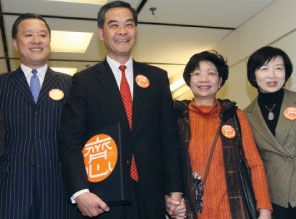Filibustering is an obstacle to good governance
Updated: 2012-08-01 06:58
(HK Edition)
|
|||||||
|
Fanny Law (right) is pictured with Leung Chun-ying, his wife Regina and Barry Cheung when they submitted nominations for the 2012 Chief-Executive election. Photo Provided by Interviewee |
Fanny Law hopes Leung Chun-ying's new administration will have a better relationship with the Legislative Council, when all the 70 lawmakers are returned following the September election. Given 2012 is an election year, many issues have become magnified and politicized but she expects things will improve once the election is over.
"I hope the government will improve its relationship with the Legislative Council," she said. "If they often confront each other or if filibustering continues, it will not be in the best interest of Hong Kong, because many important matters will be delayed. We respect the views of the minority, yet the minority should also respect the views of the majority or the views of society as a whole. We can't let a small group of people who are unsatisfied with the government pull on the legs of the government or else a type of tyranny of the minority will emerge. Take the replacement mechanism to fill vacancies in LegCo for example. The government recalled the proposal last year, consulted the public again and came up with a revised proposal acceptable to the majority, yet it was dragged out for more than 100 hours of debate spanning a month before it was finally carried by LegCo."
Very true, Law was a victim of filibustering, when Chief Executive Leung Chun-ying's government reorganization proposal failed to pass in time for the new administration to be sworn in on July 1. Law felt certain the aim of the opposition parties was to pull down the proposal just to embarrass Leung and his new cabinet.
As head of the Office of the Chief Executive-elect, she spent nearly 100 hours attending meetings of various panels, the Establishment Subcommittee and Finance Committee to answer simple questions that were repeated again and again. Owing to the bottlenecks in meeting agendas resulting from filibustering, the reorganization proposal never made it to a full plenary debate before the legislative term expired at midnight, on July 17.
She said: "It was a pity it was pulled down, leaving the future of the two new bureaus in doubt. The cultural Bureau and the technology bureau are what the professions have been advocating for many years. Particularly, the technology bureau was designed to be headed by a professional from the IT sector."
Asked if the government would spilt or scale down the reorganization proposal, she said it was possible if it increased the likelihood of getting carried by LegCo.
"Don't the democrats say questions related to policy should be asked at panel meetings but not at Finance Committee meetings? Yet at the FC meetings, they raised a lot of policy questions despite the fact I had already explained the reorganization proposal at panel meetings," she grumbled.
On July 16, Chief Executive Leung Chun-ying told LegCo he would increase the old age allowance to HK$2,200 and proposed a special FC meeting in early October to approve the funding, yet he was criticized for bypassing the relevant panel and House Committee.
"They should speed up things for the citizens who are most in need and deal with this special matter in a special way," Law responded. "There is no such thing as bypassing, knowing all the lawmakers sit on the Finance Committee."
(HK Edition 08/01/2012 page4)
